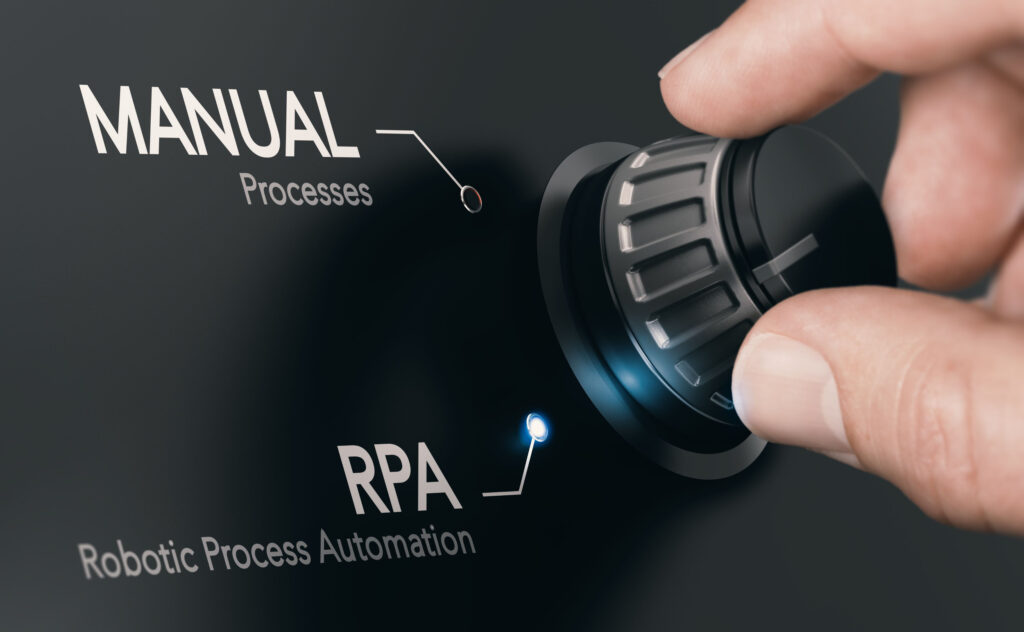What is RPA (Robotic Process Automation) and its Role in HR?

Robotic Process Automation (RPA) is software that efficiently replaces human effort in doing mundane and repetitive tasks. Known as “BOTS,” it is being deployed to perform various tasks within a digital enterprise.
This automation of human activities such as data entry, response to basic customer service inquiries, and standard transactions, allows enterprises to enhance productivity and accuracy, which leads to better return on investment (ROI).
How can RPA Improve Human Resources?
Tech writer Karl Utermohlen reports that 98 percent of IT business leaders have said that automating processes is essential to driving business benefits. Hadoop researchers have estimated that by 2025, RPA promises to save companies $5 trillion to $7 trillion in expenses.
As businesses continue to experience the disruptive impact of technology, the repetitive nature of many HR functions makes it logical to automate. Specifically, RPA can help human capital in business become more efficient.
Routine payroll administration, employee records management, and other transaction-related tasks can be streamlined.
Below are some ways wherein RPA technology can help HR departments operate at higher levels:
- Performance monitoring and management. Companies across all industries are concerned about evaluating the performance and productivity of employees. RPA can implement and monitor specific job delineation and metrics that would allow for better performance evaluation; it can also help HR identify rewards and incentives that will keep their employees engaged and their performance consistently excellent.
- Acquisition of prime talent. The use of RPA technology and tapping a more digital experience would not only enhance candidate recruitment efforts but also portray the company’s willingness to adopt innovation and new technologies. This aspect is a key consideration of young professionals, especially in the IT industry, in making career decisions.
- Employee servicing. These days, company culture and experience matter more than ever before. This means human resources must employ a holistic and integrated approach that considers the experience and comfort of employees. At the end of the day, HR’s clients are not external; their primary customers are the talents and employees of the company.
By using RPA, companies will be utilizing advanced tools that make it easier for employees to manage personal concerns related to their employment. IT makes it easier for staff members to interact with the company, process what they need, and experience higher levels of personal satisfaction. All of these individual benefits have a direct impact on the overall productivity of the enterprise.
In terms of the backend, maximizing the use of technology means eliminating a bulky and resource-heavy paper trail; it also makes candidate and employee record keeping much more accessible.
The advantages discussed above are by no means the end of the list of benefits RPA offers. The potential of RPA across HR processes covers everything from recruitment all the way through career development, training, promotions, and transitions in and out of the company.
New RPA can dramatically improve overall operations through the following:
- Lower operating costs: RPA improves efficiency, thereby lowering the possibility of costly mistakes and the need for employees to carry out mundane tasks. This means organizations can operate with lean but productive teams.
- Scalability: RPA can help recruiters ramp up their recruitment efforts or slow them down, depending on your operational requirements. For example, as the business expands, RPA processes can accommodate or be made portable, as needed.
- Increased transparency and accountability: Digital operations result in fully maintained logs that are essential in tracking access, identifying accountability, and tracing processes undertaken for monitoring and auditing purposes. If an HR issue arises, data and system administrators can track persons involved; RPA can also help them quickly identify areas of improvement.
All industries across all operational sizes have the potential to transform their operations by taking advantage of the capabilities being offered by intelligent automation, especially RPA. Early adopters who get ahead of this technology will be able to fully maximize its business opportunities and the bottom line it can offer.